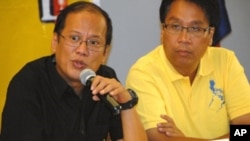Campaigning is drawing to a close in the Philippines ahead of next Monday's national election. There are concerns about the vote count because of glitches in a new automated voting system.
The campaign across the Philippines has been loud but relatively peaceful across most of the country.
Friday is the last day of campaigning before the election. Opinion polls show Liberal Party candidate Benigno "Noynoy" Aquino, son of the late President Cory Aquino, emerging as the favorite to become the next president.
His top challengers are businessman Manny Villar and former President Joseph Estrada, who was ousted by a people power movement coup in 2001 and jailed for corruption.
More than 50 million Filipinos will vote Monday for a new president, vice president, 12 senators, 287 congressmen, and more than 17,000 provincial and community officials.
However, there are concerns the entire voting process could grind to a halt on Monday because of software problems in the automated voting system being used here for the first time.
"This is certainly alarming," says Pete Troilo, the director of business intelligence for risk consultants Pacific Strategies and Assessments. "I think nearly every segment of Philippine society including the international monitors, as well as the foreign investor business community are now probably more concerned than ever. This is based on the recent failure of the tests."
If the automated voting system works, Aquino will know within two or three days whether his campaign for the presidency has been successful. However, if the machines fail and ballots must be counted by hand, it could take weeks to get the results.
This has raised the possibility that the election will be dogged by accusations of cheating and vote rigging, which has happened in past elections.
President Gloria Arroyo, who leaves office after this election, fought an impeachment effort after she was elected in 2004 over allegations of vote rigging. Mrs. Arroyo is limited to one term and is running for a congressional seat in this election.
Although by Philippine standards, this election has been peaceful, there has been sporadic violence, especially in the south, where rebels and the private militias of wealthy politicians have tried to intimidate voters.
Late last year, 57 people were killed by men linked to a provincial governor when they were on the way to register a rival candidate for the gubernatorial race. More than 180 people have been arrested in the case and face trial.




